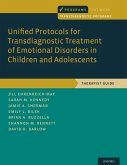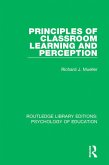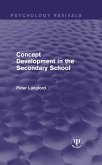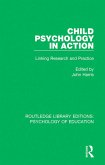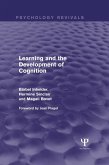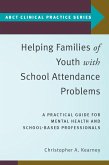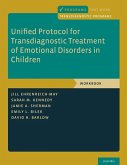Dorothy Singer, Roberta Michnick Golinkoff, Kathy Hirsh-Pasek
Play = Learning (eBook, ePUB)
How Play Motivates and Enhances Children's Cognitive and Social-Emotional Growth
25,95 €
25,95 €
inkl. MwSt.
Sofort per Download lieferbar

13 °P sammeln
25,95 €
Als Download kaufen

25,95 €
inkl. MwSt.
Sofort per Download lieferbar

13 °P sammeln
Jetzt verschenken
Alle Infos zum eBook verschenken
25,95 €
inkl. MwSt.
Sofort per Download lieferbar
Alle Infos zum eBook verschenken

13 °P sammeln
Dorothy Singer, Roberta Michnick Golinkoff, Kathy Hirsh-Pasek
Play = Learning (eBook, ePUB)
How Play Motivates and Enhances Children's Cognitive and Social-Emotional Growth
- Format: ePub
- Merkliste
- Auf die Merkliste
- Bewerten Bewerten
- Teilen
- Produkt teilen
- Produkterinnerung
- Produkterinnerung

Bitte loggen Sie sich zunächst in Ihr Kundenkonto ein oder registrieren Sie sich bei
bücher.de, um das eBook-Abo tolino select nutzen zu können.
Hier können Sie sich einloggen
Hier können Sie sich einloggen
Sie sind bereits eingeloggt. Klicken Sie auf 2. tolino select Abo, um fortzufahren.

Bitte loggen Sie sich zunächst in Ihr Kundenkonto ein oder registrieren Sie sich bei bücher.de, um das eBook-Abo tolino select nutzen zu können.
In Play=Learning , top experts in child development and learning contend that in over-emphasizing academic achievement, our culture has forgotten about the importance of play for children's development.
- Geräte: eReader
- mit Kopierschutz
- eBook Hilfe
- Größe: 1.5MB
Andere Kunden interessierten sich auch für
![Unified Protocols for Transdiagnostic Treatment of Emotional Disorders in Children and Adolescents (eBook, ePUB) Unified Protocols for Transdiagnostic Treatment of Emotional Disorders in Children and Adolescents (eBook, ePUB)]() Jill Ehrenreich-MayUnified Protocols for Transdiagnostic Treatment of Emotional Disorders in Children and Adolescents (eBook, ePUB)51,95 €
Jill Ehrenreich-MayUnified Protocols for Transdiagnostic Treatment of Emotional Disorders in Children and Adolescents (eBook, ePUB)51,95 €![Principles of Classroom Learning and Perception (eBook, ePUB) Principles of Classroom Learning and Perception (eBook, ePUB)]() Richard J. MuellerPrinciples of Classroom Learning and Perception (eBook, ePUB)41,95 €
Richard J. MuellerPrinciples of Classroom Learning and Perception (eBook, ePUB)41,95 €![Concept Development in the Secondary School (eBook, ePUB) Concept Development in the Secondary School (eBook, ePUB)]() Peter LangfordConcept Development in the Secondary School (eBook, ePUB)27,95 €
Peter LangfordConcept Development in the Secondary School (eBook, ePUB)27,95 €![Child Psychology in Action (eBook, ePUB) Child Psychology in Action (eBook, ePUB)]() Child Psychology in Action (eBook, ePUB)39,95 €
Child Psychology in Action (eBook, ePUB)39,95 €![Learning and the Development of Cognition (Psychology Revivals) (eBook, ePUB) Learning and the Development of Cognition (Psychology Revivals) (eBook, ePUB)]() Barbel InhelderLearning and the Development of Cognition (Psychology Revivals) (eBook, ePUB)35,95 €
Barbel InhelderLearning and the Development of Cognition (Psychology Revivals) (eBook, ePUB)35,95 €![Helping Families of Youth with School Attendance Problems (eBook, ePUB) Helping Families of Youth with School Attendance Problems (eBook, ePUB)]() Christopher A. KearneyHelping Families of Youth with School Attendance Problems (eBook, ePUB)24,95 €
Christopher A. KearneyHelping Families of Youth with School Attendance Problems (eBook, ePUB)24,95 €![Unified Protocol for Transdiagnostic Treatment of Emotional Disorders in Children (eBook, ePUB) Unified Protocol for Transdiagnostic Treatment of Emotional Disorders in Children (eBook, ePUB)]() Jill Ehrenreich-MayUnified Protocol for Transdiagnostic Treatment of Emotional Disorders in Children (eBook, ePUB)32,95 €
Jill Ehrenreich-MayUnified Protocol for Transdiagnostic Treatment of Emotional Disorders in Children (eBook, ePUB)32,95 €-
-
-
In Play=Learning, top experts in child development and learning contend that in over-emphasizing academic achievement, our culture has forgotten about the importance of play for children's development.
Dieser Download kann aus rechtlichen Gründen nur mit Rechnungsadresse in A, B, BG, CY, CZ, D, DK, EW, E, FIN, F, GR, HR, H, IRL, I, LT, L, LR, M, NL, PL, P, R, S, SLO, SK ausgeliefert werden.
Produktdetails
- Produktdetails
- Verlag: OUP eBook
- Erscheinungstermin: 24. August 2006
- Englisch
- ISBN-13: 9780199885381
- Artikelnr.: 42522501
- Verlag: OUP eBook
- Erscheinungstermin: 24. August 2006
- Englisch
- ISBN-13: 9780199885381
- Artikelnr.: 42522501
- Herstellerkennzeichnung Die Herstellerinformationen sind derzeit nicht verfügbar.
Dorothy G. Singer received her doctorate in School Psychology from Teachers College, Columbia University. She is Senior Research Scientist, Department of Psychology, Yale University. She is also Co-Director, with Jerome L. Singer, of the Yale University Family Television Research and Consultation Center. An expert on early childhood development, television effects on youth and parent training in imaginative play, she has written 20 books and over 150 articles. Her latest books are Handbook of Children and the Media , Make-Believe: Games and Activities for Imaginative Play and Imagination and Play in the Electronic Age. She co-edited Children's Play: Roots of Reading,, which was selected for CHOICE's Outstanding Academic Title list. She received the award for Distinguished Scientific Contributions to the Media by Division 46 of APA in 2004. Roberta Michnick Golinkoff obtained her doctorate from Cornell University. After a postdoctoral fellowship at the University of Pittsburgh's Learning Research and Development Center, she joined the University of Delaware. She holds a Chair in the School of Education, with joint appointments in Psychology and Linguistics. A Guggenheim Fellow and a James McKeen Cattell award winner, she has written dozens of journal articles, chapters and academic books, the latest of which is Action Meets Word: How Children Learn Verbs (OUP 2005) co-edited with Kathy Hirsh-Pasek. She lectures internationally and has written two popular books with Kathy Hirsh-Pasek: How Babies Talk and Einstein Never Used Flash Cards, which was awarded the Multiple Sclerosis Society's Books for a Better Life award. Kathy Hirsh-Pasek is the Stanley and Debra Lefkowitz Professor in the Department of Psychology at Temple University, where she serves as Director of the Infant Language Laboratory. She received her Bachelor's degree from the University of Pittsburgh and her Ph.D. from University of Pennsylvania. Her research in the areas of early language development and infant cognition has been funded by the National Science Foundation and the National Institutes of Health and Human Development, resulting in 9 books and numerous publications. She is a Fellow of the APA and the American Psychological Society, serves as the Associate Editor of Child Development , and is treasurer of the International Association for Infant Studies. She has published more than 100 professional articles and has given over 80 invited lectures around the world.
* 1: Roberta Michnik Golinkoff, Kathy Hirsh-Pasek, and Dorothy G.
Singer: Why Play=Learning: A Challenge for Parents and Educators
* Part I. Challenges to Play
* 2: Edward F. Zigler and Sandra J. Bishop-Josef: The Cognitive Child
vs. the Whole Child: Lessons from 40 Years of Head Start
* 3: Anthony D. Pellegrini and Robyn M. Holmes: The Role of Recess in
Primary School
* Part II. School Readiness - School Standards
* 4: James F. Christie and Kathleen A. Roskos: Standards, Science, and
the Role of Play in Early Literacy Education
* 5: Laura E. Berk, Trisha D. Mann, and Amy T. Ogan: Make-Believe Play:
Wellspring for Development of Self-Regulation
* 6: Harvey F. Bellin and Dorothy G. Singer: 'My Magic Story Car':
Video-Based Play Intervention to Strengthen Emergent Literary of
At-Risk Preschoolers
* 7: Ageliki Nicolopoulou, Judith McDowell, and Carolyn Brockmeyer:
Narrative Play and Emergent Literacy: Storytelling and Story-Acting
Meets Journal Writing
* 8: Herbert P. Ginsburg: Mathematical Play and Playful Mathematics: A
Guide for Early Education
* Part III. Media and Computers
* 9: Deborah S. Weber: Media Use by Infants and Toddlers: A Potential
for Play
* 10: Mitchel Resnick: Computer as Paintbrush: Technology, Play, and
the Creative Society
* Part IV. Play With Dysfunctional Children
* 11: Wendy Haight, James Black, Teresa Jacobsen, and Kathryn Sheridan
: Pretend Play and Emotion: Learning in Traumatized Mothers and
Children
* 12: Melissa Allen Preissler: Play and Autism: Facilitating Symbolic
Understanding
* 13: Jerome L. Singer: Epilogue: Learning to Play and Learning Through
Play
Singer: Why Play=Learning: A Challenge for Parents and Educators
* Part I. Challenges to Play
* 2: Edward F. Zigler and Sandra J. Bishop-Josef: The Cognitive Child
vs. the Whole Child: Lessons from 40 Years of Head Start
* 3: Anthony D. Pellegrini and Robyn M. Holmes: The Role of Recess in
Primary School
* Part II. School Readiness - School Standards
* 4: James F. Christie and Kathleen A. Roskos: Standards, Science, and
the Role of Play in Early Literacy Education
* 5: Laura E. Berk, Trisha D. Mann, and Amy T. Ogan: Make-Believe Play:
Wellspring for Development of Self-Regulation
* 6: Harvey F. Bellin and Dorothy G. Singer: 'My Magic Story Car':
Video-Based Play Intervention to Strengthen Emergent Literary of
At-Risk Preschoolers
* 7: Ageliki Nicolopoulou, Judith McDowell, and Carolyn Brockmeyer:
Narrative Play and Emergent Literacy: Storytelling and Story-Acting
Meets Journal Writing
* 8: Herbert P. Ginsburg: Mathematical Play and Playful Mathematics: A
Guide for Early Education
* Part III. Media and Computers
* 9: Deborah S. Weber: Media Use by Infants and Toddlers: A Potential
for Play
* 10: Mitchel Resnick: Computer as Paintbrush: Technology, Play, and
the Creative Society
* Part IV. Play With Dysfunctional Children
* 11: Wendy Haight, James Black, Teresa Jacobsen, and Kathryn Sheridan
: Pretend Play and Emotion: Learning in Traumatized Mothers and
Children
* 12: Melissa Allen Preissler: Play and Autism: Facilitating Symbolic
Understanding
* 13: Jerome L. Singer: Epilogue: Learning to Play and Learning Through
Play
* 1: Roberta Michnik Golinkoff, Kathy Hirsh-Pasek, and Dorothy G.
Singer: Why Play=Learning: A Challenge for Parents and Educators
* Part I. Challenges to Play
* 2: Edward F. Zigler and Sandra J. Bishop-Josef: The Cognitive Child
vs. the Whole Child: Lessons from 40 Years of Head Start
* 3: Anthony D. Pellegrini and Robyn M. Holmes: The Role of Recess in
Primary School
* Part II. School Readiness - School Standards
* 4: James F. Christie and Kathleen A. Roskos: Standards, Science, and
the Role of Play in Early Literacy Education
* 5: Laura E. Berk, Trisha D. Mann, and Amy T. Ogan: Make-Believe Play:
Wellspring for Development of Self-Regulation
* 6: Harvey F. Bellin and Dorothy G. Singer: 'My Magic Story Car':
Video-Based Play Intervention to Strengthen Emergent Literary of
At-Risk Preschoolers
* 7: Ageliki Nicolopoulou, Judith McDowell, and Carolyn Brockmeyer:
Narrative Play and Emergent Literacy: Storytelling and Story-Acting
Meets Journal Writing
* 8: Herbert P. Ginsburg: Mathematical Play and Playful Mathematics: A
Guide for Early Education
* Part III. Media and Computers
* 9: Deborah S. Weber: Media Use by Infants and Toddlers: A Potential
for Play
* 10: Mitchel Resnick: Computer as Paintbrush: Technology, Play, and
the Creative Society
* Part IV. Play With Dysfunctional Children
* 11: Wendy Haight, James Black, Teresa Jacobsen, and Kathryn Sheridan
: Pretend Play and Emotion: Learning in Traumatized Mothers and
Children
* 12: Melissa Allen Preissler: Play and Autism: Facilitating Symbolic
Understanding
* 13: Jerome L. Singer: Epilogue: Learning to Play and Learning Through
Play
Singer: Why Play=Learning: A Challenge for Parents and Educators
* Part I. Challenges to Play
* 2: Edward F. Zigler and Sandra J. Bishop-Josef: The Cognitive Child
vs. the Whole Child: Lessons from 40 Years of Head Start
* 3: Anthony D. Pellegrini and Robyn M. Holmes: The Role of Recess in
Primary School
* Part II. School Readiness - School Standards
* 4: James F. Christie and Kathleen A. Roskos: Standards, Science, and
the Role of Play in Early Literacy Education
* 5: Laura E. Berk, Trisha D. Mann, and Amy T. Ogan: Make-Believe Play:
Wellspring for Development of Self-Regulation
* 6: Harvey F. Bellin and Dorothy G. Singer: 'My Magic Story Car':
Video-Based Play Intervention to Strengthen Emergent Literary of
At-Risk Preschoolers
* 7: Ageliki Nicolopoulou, Judith McDowell, and Carolyn Brockmeyer:
Narrative Play and Emergent Literacy: Storytelling and Story-Acting
Meets Journal Writing
* 8: Herbert P. Ginsburg: Mathematical Play and Playful Mathematics: A
Guide for Early Education
* Part III. Media and Computers
* 9: Deborah S. Weber: Media Use by Infants and Toddlers: A Potential
for Play
* 10: Mitchel Resnick: Computer as Paintbrush: Technology, Play, and
the Creative Society
* Part IV. Play With Dysfunctional Children
* 11: Wendy Haight, James Black, Teresa Jacobsen, and Kathryn Sheridan
: Pretend Play and Emotion: Learning in Traumatized Mothers and
Children
* 12: Melissa Allen Preissler: Play and Autism: Facilitating Symbolic
Understanding
* 13: Jerome L. Singer: Epilogue: Learning to Play and Learning Through
Play

